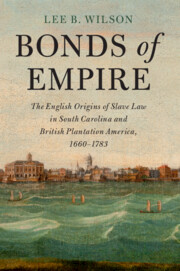 Bonds of Empire
Bonds of Empire Published online by Cambridge University Press: 02 July 2021
The book concludes with a preview of slave law in the early republic. Although independence transformed English subjects into American citizens, much about slave law remained the same; English law and English legal procedure continued to be useful for citizens living in a slaveholders’ republic. Republican legal forms were not, in the end, significantly different from forms used under a monarchy, and this had far-reaching consequences. In particular, this legal continuity from the colonial period meant that the commodification of slaves not only continued, but also spread along with the expanding United States. Settlers in new plantation areas of the Deep South, who were steeped in a legal culture that valued tradition, modeled their slave laws on those of South Carolina, and therefore on the language, practices, and precedents of English chattel slavery. The plantation society that they constructed, by hewing so closely to English legal forms, perpetuated the invidious legal fiction that people were things as a working reality in the slave South.
To save this book to your Kindle, first ensure no-reply@cambridge.org is added to your Approved Personal Document E-mail List under your Personal Document Settings on the Manage Your Content and Devices page of your Amazon account. Then enter the ‘name’ part of your Kindle email address below. Find out more about saving to your Kindle.
Note you can select to save to either the @free.kindle.com or @kindle.com variations. ‘@free.kindle.com’ emails are free but can only be saved to your device when it is connected to wi-fi. ‘@kindle.com’ emails can be delivered even when you are not connected to wi-fi, but note that service fees apply.
Find out more about the Kindle Personal Document Service.
To save content items to your account, please confirm that you agree to abide by our usage policies. If this is the first time you use this feature, you will be asked to authorise Cambridge Core to connect with your account. Find out more about saving content to Dropbox.
To save content items to your account, please confirm that you agree to abide by our usage policies. If this is the first time you use this feature, you will be asked to authorise Cambridge Core to connect with your account. Find out more about saving content to Google Drive.